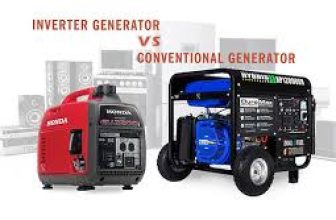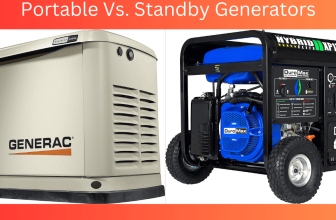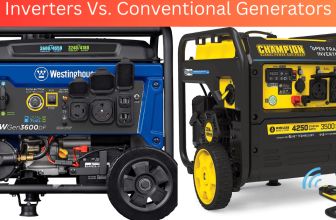Hey there! I’m sure you’ve seen and heard of inverters vs. conventional generators, but have you ever stopped to think about the pros and cons of each one?
It can be hard to decide which type of generator is right for you, especially when there are so many factors to consider. That’s why I’m here to help – in this article, I’ll discuss the advantages and disadvantages of inverter vs. conventional generators so you can make an informed decision that suits your needs best.
So let’s dive into the details and find out all the facts!
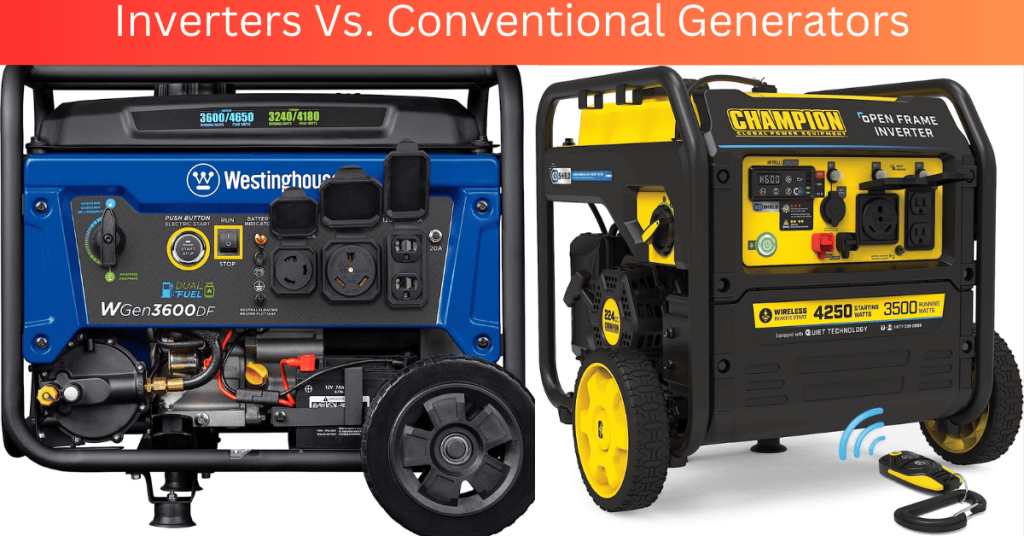
What Is An Inverter Generator?
I’m sure you’ve heard the term ‘inverter generator’ before, but do you know what it is?
Inverter generators are a type of portable generator that can produce electricity to power your appliances and devices. Either petrol or diesel powers them and are often chosen due to their low noise output and fuel efficiency.
Inverter generators convert the raw energy produced by the engine into a clean, stable form of electricity. This type of electricity is suitable for electronics such as phones, computers, TVs etc. It also produces minimal levels of harmonic distortion, which means less interference with other electrical equipment.
Inverter generators come in various sizes and power outputs to suit any application from camping trips to powering up an entire home during a blackout. They’re also great for RV owners who need to power up their appliances on the go.
With so much going for them, inverter generators are becoming increasingly popular compared to their conventional counterparts. Now let’s take a look at what a conventional generator is…
What Is A Conventional Generator?
An inverter generator is a type of generator that uses advanced technology to produce a steady and pure sine wave output.
On the other hand, a conventional generator is the traditional type of generator that produces energy from an engine-driven alternator system which powers the motor.
The main difference between the two types of generators is their output power.
Inverter generators are much quieter and more efficient, while conventional generators tend to be louder and less fuel-efficient.
When it comes to choosing between an inverter generator and a conventional generator, there are several factors to consider.
Inverter generators tend to be lighter, quieter, and more fuel-efficient than conventional generators, making them ideal for camping trips or other outdoor activities where noise levels should be kept low.
Furthermore, they offer higher quality power with fewer spikes or surges in voltage than conventional units – making them suitable for high-tech appliances like computers or televisions.
On the downside, inverter generators tend to cost more than conventional models and require more maintenance over time due to their sophisticated technology.
In contrast, conventional generators often offer lower initial costs but also come with higher operational costs due to their lower efficiency rating and greater fuel consumption.
They’re also much louder than inverters, making them less suitable for use in residential areas or other locations where noise can be disruptive.
However, they have their advantages too; they’re generally easier to maintain since they lack the sophisticated electronics found in inverters and are still capable of producing sufficient power for most applications, such as home backup systems or powering construction sites.
Considering all these factors can help you decide which type of generator is best suited for your needs – whether you’re looking for something portable for camping trips or need a reliable source of backup power at home.
Next up, we’ll look at some cost considerations when it comes to selecting an inverter vs. conventional generator so you can make an informed decision about what’s right for you.
Cost Considerations
When it comes to cost considerations, both inverter and conventional generators have their advantages. From a budget standpoint, conventional generators are generally more affordable than inverters. That said, the initial cost of a conventional model may be deceiving.
Over time, an inverter generator will be more economical due to its fuel efficiency and longer life span. Inverter generators are designed with technology that allows them to adjust their speed based on the power needs of your appliances or tools. This changes the fuel consumption and can save you money in the long run.
Inverter generators also have a longer life span than conventional models because they don’t experience as much wear and tear from continually starting and stopping during use. Ultimately, when it comes to cost considerations, there is no one-size-fits-all answer – it all boils down to how you plan to use your generator and your budget. Both types of generator can be great investments if used appropriately, so take some time to weigh up all the options before making a decision for your specific needs.
With this in mind, let’s move onto noise level – an important factor for most people when shopping for a generator.
Noise Level
Let’s look at the noise level of both inverter and conventional generators. When it comes to noise, both types have their own pros and cons. So let’s examine the differences between them:
| Inverter Generators | Conventional Generators |
|---|---|
| Quieter than conventional generators, with decibel levels ranging from 40 to 60 dB. | Louder than inverter generators, with decibel levels ranging from 65 to 95 dB. |
| Not suitable for residential areas or any other area where people and noise regulations are enforced. | They are more expensive than conventional generators due to advanced technology and reduced sound emissions. |
| More expensive than conventional generators due to advanced technology and reduced sound emissions. | Cheaper than inverter generators because they don’t require advanced technology and sound reduction features. |
It’s clear that when it comes to noise, inverter generators have a distinct advantage over conventional ones. They produce less loud noises and are quieter overall, making them much better suited for residential areas or any other location where noise levels need to be monitored closely. On the other hand, if you’re looking for an affordable generator that is still powerful enough for all your needs, conventional generators may be a better option as they come at a lower cost but may not be suitable in some areas due to their higher noise output.
Now let’s move on to fuel efficiency – an important factor when considering which type of generator is right for you.
Fuel Efficiency
As we consider the pros and cons of inverters vs. conventional generators, fuel efficiency is important.
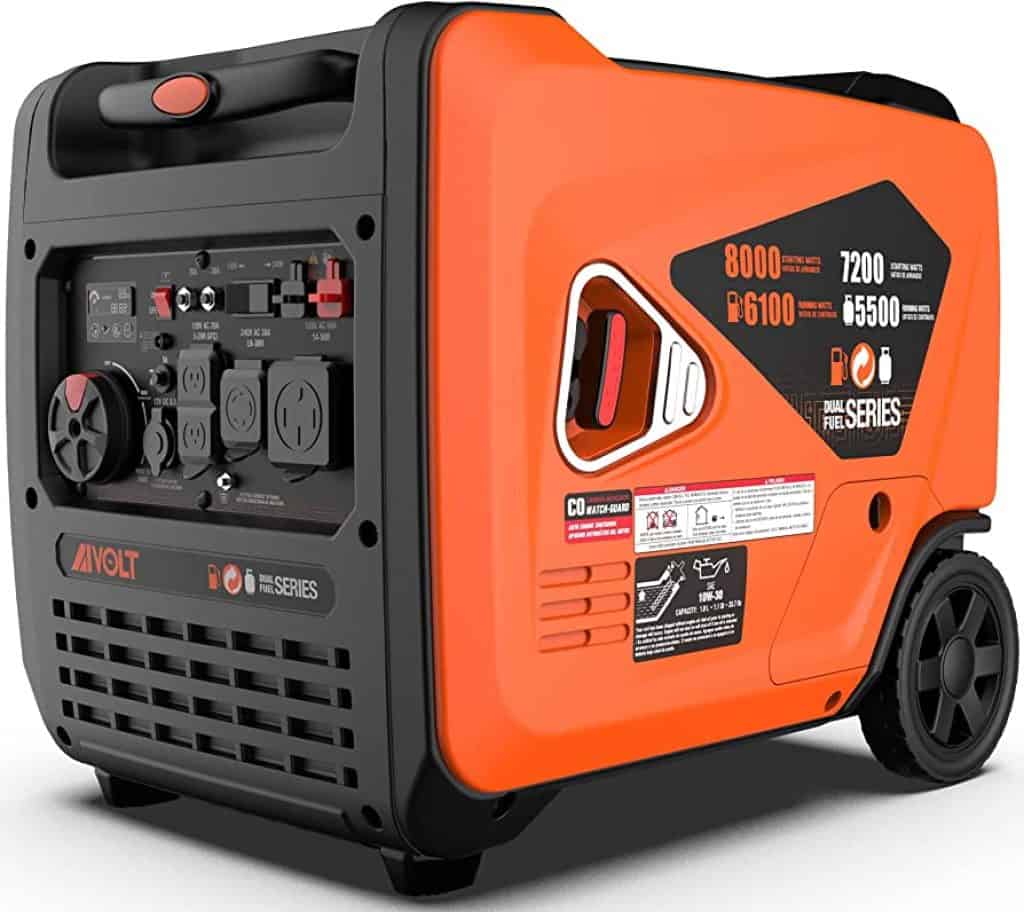
When it comes to fuel efficiency, inverter generators come out ahead. That’s because they can adjust their engine speed based on how much power you’re using – so they use less fuel when running at lower levels. This makes them more energy-efficient than conventional generators, which run at a fixed speed regardless of the load.
Inverter generators also offer several other advantages that make them more fuel-efficient than conventional generators. For starters, inverters are typically smaller in size and lighter in weight, which means they require less fuel to operate. Additionally, they create cleaner power that won’t damage sensitive electronics like laptops and cell phones – so you don’t have to worry about wasting precious energy.
When it comes to saving money on fuel costs, inverter generators are definitely worth considering over conventional models. From their adjustable engine speeds to their compact sizes and clean power output, these generators offer a number of advantages that make them an attractive option for anyone looking for ways to reduce their energy consumption.
Now let’s take a closer look at the power output differences between inverters and conventional generators.
Power Output
Now that we’ve discussed fuel efficiency let’s move on to power output.
Power output is an important factor to consider when deciding between an inverter and a conventional generator.
Inverter generators are designed to provide clean and stable power for sensitive electronics like computers, cell phones, and TVs.
They usually offer higher wattage than conventional generators and can provide more consistent power over a longer period without much fluctuation in voltage.
On the other hand, traditional generators are generally less expensive but offer lower wattage and can cause a dip or surge in voltage when under heavy load.
When running larger appliances such as air conditioners or refrigerators, traditional generators may be the better choice for those on a budget.
However, if you need to run sensitive electronics like computers or TVs,, an inverter generator is the more brilliant option due to its ability to produce cleaner power with minimal fluctuations in voltage.
Furthermore, inverter generators often come with additional features such as USB ports, making them more user-friendly and convenient than traditional generators.
Overall, deciding between an inverter generator and a conventional generator will depend on your needs.
Both types have unique advantages and disadvantages,, so it is essential to weigh your options carefully before making a purchase.
With this information in mind, let’s look at portability—the next factor we’ll consider when comparing these two types of power sources.
Portability
When it comes to portability, inverters and conventional generators are both quite convenient. Thanks to their compact design, inverters are smaller, lighter, and easier to transport. And, because they can be connected to a car battery or solar panel, you don’t need to worry about finding an outlet or gas station.
On the other hand, conventional generators tend to be bigger and heavier than inverters. Their larger size makes them more difficult to move around and transport. However, they do have the advantage of running on fuel like gasoline or diesel, so you’re not as limited in terms of where you can use them.
In terms of cost-effectiveness, inverters may be the way to go if you’re looking for something more affordable. They are generally cheaper than conventional generators due to their smaller size and lower power output requirements. Plus, since they don’t require fuel like gasoline or diesel, there are no additional costs involved with running them.
Conventional generators can still be an economical choice depending on your power needs since they often offer higher wattage outputs than inverters. Overall, when it comes to portability and cost-effectiveness, both inverters and conventional generators have their advantages and disadvantages. Your decision should come down to how much energy you need and how important portability is in your situation.
When weighing the pros and cons of each option, carefully consider your own specific needs before making a decision. With that being said, let’s turn our attention now to maintenance requirements for these two types of generators.
Maintenance Requirements
When it comes to maintenance requirements, it’s important to consider both inverter and conventional generators.
Inverter generators are typically easier to maintain than their conventional counterparts. They require fewer oil changes and do not need carburettor adjustments. This makes them a great option if you want convenience in the long run. Additionally, inverter generators tend to be quieter and produce fewer emissions, which means they require less frequent servicing compared to traditional models.
On the other hand, conventional generators may require more frequent maintenance than inverters. They usually need oil changes every 50 hours of operation, regular tune-ups, and periodic spark plug replacement. While this may be inconvenient at times, it does ensure that your generator will last longer due to proper maintenance and upkeep. Additionally, conventional models may be better suited for larger applications, such as powering a whole house or industrial facility, since they can generate more power than an inverter generator can provide.
Overall, when weighing the pros and cons of inverters vs. conventional generators in terms of maintenance requirements, it’s important to consider your specific needs before deciding. Taking the time to research what type of generator would best meet those needs is always a worthwhile investment in the long run.
With that said, let’s take a look at safety features offered by each type of generator next.
Safety Features
One of the major differences between inverters and conventional generators is the maintenance requirements. Conventional generators require more frequent maintenance than inverter models and will need to be repaired more often. This can be an expensive undertaking, depending on the parts needed, and can also be time consuming.
| Conventional Generator | Inverter Generator |
|- | – |
| More Frequent Maintenance | Less Frequent Maintenance |
| Must Be Repaired Often | Rarely Needs Repairs |
| Expensive Parts Needed | Affordable Parts Available if Needed |
| Time Consuming Repairs | Quicker Repairs Possible If Necessary |
When it comes to safety features, inverters are again superior to conventional generators in many ways. Because they run quieter, there is less danger of hearing damage or other problems associated with loud noises. The nature of their design also offers additional protection against overloads or short circuits, ensuring that your equipment is safe from these potential issues. Finally, since they operate at a higher frequency, their performance is more efficient, leading to increased safety for those who may be using the equipment in hazardous conditions or environments.
The following section will focus on the environmental impact of both types of generators and which one is better for protecting our planet. With both designs having their own pros and co,ns we must carefully weigh all factors before making a decision about which type is best for our needs. Taking into account the noise levels, efficiency, safety features, and maintenance requirements will give us a clearer picture when it comes to choosing between an inverter or conventional generator. Moving forw,ard we’ll explore how each type impacts our environment so we can make an informed decision.
Environmental Impact
As we weigh the pros and cons of inverters vs conventional generators, one of the most important considerations is the environmental impact. We all have a responsibility to protect our planet, so it’s essential to be mindful of how our choices affect it.
Let’a look at how each type of generator impacts the environment. Inverter generators are designed to be more eco-friendly than conventional generators. They use less fuel, produce less noise pollution, and can run for longer periods without refuelling due to their advanced technology. This helps to reduce emissions and preserve natural resources. Additionally, inverters are generally smaller than conventional models which means they take up less space in landfills when they’re disposed of at the end of their lifespan.
Conventional generators may have a larger environmental footprint than inverters due to their technology and design. They burn through fuel quickly, meaning that they must be refuelled more often or run for shorter periods. This increases emissions and results in fewer overall hours of operation than inverter models, potentially leading to greater resource consumption over time. Additionally, they tend to be largee whic,h means they generate more waste when they are eventually disposed of at the end of their lifespan.
Considering both types of generators with regards to environmental impact makes it clear that inverters offer some clear advantages over conventional models – from reducing emissions and preserving natural resources to taking up less space in landfills when disposed of properly. Therefore it is worth weighing this factor carefully when deciding between an inverter vs a conventional generator for your needs.
Frequently Asked Questions
How Is An Inverter Generator Different From A Conventional Generator?
An inverter generator is a type of generator that produces AC powr, but also converts it to DC power and then back to clean AC power.
Unlike conventional generators, which produce ‘dirty’ AC power, inverters generate cleaner energy with less harmonic distortion.
This makes them more efficient and quieter than traditional generators.
Plus, they generally use smaller engines and fuel tankswhich’rere more portable and cost-effectioo!
What Type Of Fuel Does An Inverter Generator Use?
If you’re looking for an inverter generator, you should know that they typically run on gasoline.
The fuel is usually stored in the same tank as the engine, and it’s easy to top up when needed.
This makes them a great choice if you’re looking for a reliable way to power your home or other equipment.
Of course, it also means that if there’s no access to gasoline, then the generator won’t work.
So make sure you have a backup plan in case of emergencies!
How Long Does An Inverter Generator Typically Run On A Full Tank Of Fuel?
Wondering how long your inverter generator will last on a full tank? It all depends on the size of the tank, but typically you can expect anywhere from 6-10 hours of run time.
That’s pretty impressive for a machine that is usually used for camping or recreational purposes! Plus, since it runs on gas, you won’t have to worry about having to recharge it as often as other types of generators.
So if you’re looking for a generator that will provide consistent power and long-lasting performance, an inverter generator is worth considering!
How Easy Is It To Transport An Inverter Generator?
It’s easy to transport an inverter generator!
Most models are designed with portability in mind and feature convenient carrying handles.
They’re usually lighter than conventional generators, too – some weighing as little as 20-30 pounds.
Plus, their compact size allows them to fit into tight spaces, making them the perfect choice for camping and other outdoor activities.
Are Inverter Generators Safe To Use In Residential Areas?
When it comes to safety, inverter generators are an excellent choice for residential areas.
Not only are they designed to produce clean power that won’t damage any electronics you may have plugged in, but they also run quietly and don’t release as much exhaust into the air.
Plus, their lighter weight and smaller size mean you can move them around with ease if needed.
So when considering which generator to use in your home, an inverter generator is the way to go!
Conclusion
In conclusion, inverter generators and conventional generators both have their advantages and disadvantages.
Inverter generators are more fuel efficient, quieter, and easier to transport than conventional models. They may also be used in residential areas with less risk of noise or air pollution due to their advanced technology. However, they tend to be more expensive than traditional models and can require more maintenance.
Ultimately, it is up to the individual consumer to decide which generator is best for their needs. There is no one-size-fits-all solution when it comes to choosing between an inverter generator or a conventional generator; each has its own unique strengths and weaknesses.http://Powerhorse Parallel Cable Kit —Connects 7500 Watt to 7500 Watt Inverter Generators



